|
|
 |
An independent view of the world
seen from Tokelau
The Independent New York Times
Tokelau, Saturday,
November 15,
2008 Weekend Edition, editor
- contact sumpinein@gmail.com
|
 |
|
|
|
|
US AUTOMAKERS
SEEK BAIL OUT TO AVOID BANKRUPTCY |
|
|
Conservationists are excited about the
arrival, which is the first birth of a
pygmy hippo at Taronga zoo in Sydney,
Australia, in 23 years. |
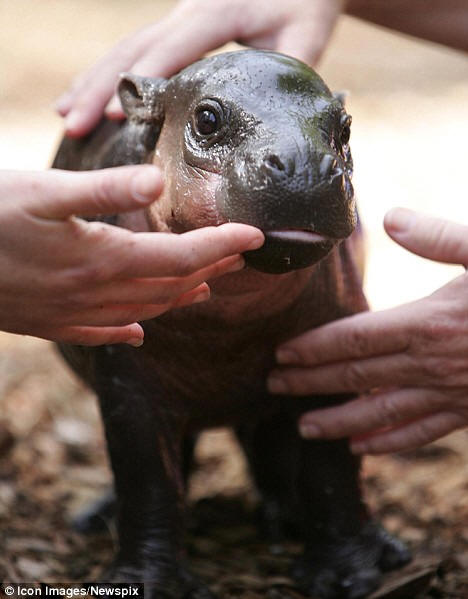 |
 |
|
A UN study says that in financial
terms currently the loss of forest
equals some US$2 to US$5 trillion every
year. Who is going to do something about
all this? Indonesian authorities
have pledged to stop the loss of forests
and species in Sumatra, one of the
world's most ecologically important
islands. Representatives of the island's
10 provinces, national government and
the environment group WWF launched the
deal at the World Conservation Congress.
Sumatra has lost about half of its
forest cover in the last 20 years. It is
home to a number of important and iconic
species such as the tiger, orangutan,
rhinoceros and elephant. The island has
suffered floods and forest fires in
recent years that have been widely
attributed to illegal forest clearance.
Two years ago, President Susilo Bambang
Yudhoyono was forced to apologise to
Singapore and Malaysia when smog from
burning Sumatran forest covered the
neighbouring countries. The need to deal
with these issues appears to have played
a big part in persuading the authorities
to act. "In the rainy months, we are
seeing landslides and flooding more
often, and it is time to make a real
change," said Indonesia's deputy
environment minister Hermien Roosita at
a news briefing here. "Every governor
from the 10 provinces and four
(national) ministries have signed this
monumental commitment to ecosystem
restoration of the island and protecting
the remaining natural forest." More than
13% of the island's forests lie on peat,
which contain vast amounts of carbon
that would be lost to the atmosphere if
the trees were removed, accelerating
climate change. "When you look at the
flora and fauna in this area and the
rate of loss that's going on, this is a
substantial commitment to protect and
restore forests," said Gordon Shepherd,
WWF's director of global policy. The
government has already regulated to stop
clearance of virgin forest for palm oil
plantations - grown for food, industry
and biofuels - but the government
acknowledges the ban may not be
completely effective. |
|
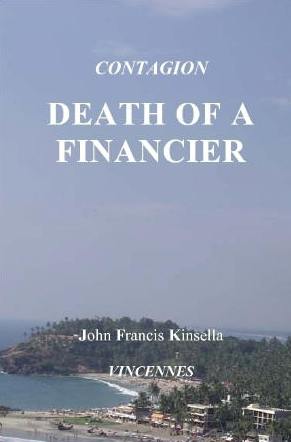
|
Read DEATH OF A
FINANCIER by JOHN
FRANCIS KINSELLA |
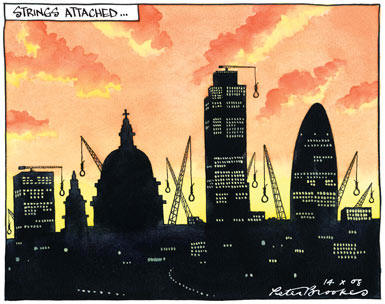
|
Tom Barton, a City
mortgage broker, decides
to quit his business in
the wake of the subprime
crisis and arrives in
Kovalam, in the south of
India. In the Maharaja
Palace he finds himself
in the company of
holiday makers from the
UK, Scandinavia and
Russia. Stephen Parkly,
the CEO of a successful
City bank, and his young
wife Emma are taking a
well earned year end
break. Parkly falls
gravely ill with a
mysterious infection,
whilst back in the City,
unknown to him his
mortgage and investment
bank, West Mercian
Finance is in grave
difficulties. Ryan
Kavanagh, a doctor,
comes to Emma’s aid with
the help of Barton,
after an attempted
cover-up by the Indian
authorities, who fear
for their tourist
industry and more
especially medical
tourism, as the disease
threatens the resort
with the tourist season
in full swing. Thousands
of British tourists
enjoying the sun are
unaware of the pending
disaster, many are
equally unaware their
savings about are to be
wiped out in the West
Mercian collapse. |
|
|
|
|
GETTING READY FOR A
NEW LIFE |

|
Life for the
newly chosen
president and
his family has
changed forever.
Even the
constraints and
security of the
campaign trail
do not compare
to the bubble
that has
enveloped him in
the 10 days
since his
election.
Renegade, as the
Secret Service
calls him, now
lives within the
strict limits
that come with
the most
powerful office
on the planet.
He has chosen to
spend this
interval before
his Jan. 20
inauguration at
his home in Hyde
Park, which has
in some ways
been transformed
into a secure
fortress for his
protection.
After two years
of daily
speeches and
rallies, he has
retreated into
an almost hermitlike
seclusion,
largely hidden
from public view
and spotted only
when he drops
his two
daughters off
for school or
goes for a
workout at the
gymnasium in a
friend’s
apartment
building. |
|
|
|
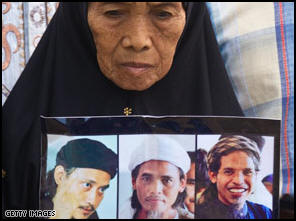
|
Indonesian
security
forces
are on high
alert after
the state
execution of
three
Islamic
militants
for the 2002
Bali
bombings
that killed
202 people.
There were
reports of
clashes as
hundreds of
supporters
attended
burials in
the men's
home
villages in
Java. Imam
Samudra,
Amrozi
Nurhasyim
and Ali
Ghufron (Mukhlas)
were killed
by firing
squad at
0015 (1715
GMT on
Saturday).
They were
found guilty
of planning
twin attacks
on
nightclubs
at the
resort of
Kuta,
popular with
Western
tourists.
Security
forces are
on alert
across the
country amid
fears of
reprisal
attacks.
Australia,
which lost
88 of its
citizens in
the attacks,
has issued a
warning
against
travel to
the country.
Britain and
the US have
done
likewise.
|
|
|
DUBAI - NO SEX PLEASE |
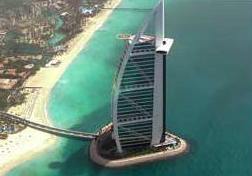 |
|
One of Dubai’s most
popular beach hotels has
issued guests with an
“etiquette guide” after
two Britons were
convicted for having sex
on the beach near the
hotel. The etiquette
guides, which suggest
the hotel’s guests could
be arrested for
inappropriate public
displays, are left on
tables during the weekly
brunch event at the
Madinat Jumeirah hotel.
The guests should
"employ discretion" in
expressing affection
publicly, says the
hotel, with "anything
more than a peck on the
cheek" likely to result
in police involvement.
The two Britons
convicted last month
of having sexual
intercourse outside
marriage and offending
public decency, were
Michelle Palmer and
Vince Acors. They were
arrested after attending
brunch at a hotel near
Dubai airport. They were
received three-month
jail sentences, were
fined £200 for
drunkenness and ordered
to be deported from
Dubai on their release.
More than 230 other
Britons were arrested in
the UAE last year.
Brunches take place
across Dubai every
Friday, the first day of
the Dubai weekend, and
are heavily promoted in
Dubai's Time Out
and enjoyed to the full
by expatriates. The
lavish affairs last from
late morning into the
early evening when
diners can enjoy
unlimited food and
alcohol for a fixed
entry fee. In the case
of the
Madinat Jumeirah the
charge is £88, which
includes bottomless
champagne, cocktails and
wine between 12:30pm and
4:30pm. On the subject
of drunkenness, the
hotel’s etiquette guide
warns: “Drinking is not
a part of Muslim culture
and alcohol is not
served openly. Drunken
behaviour, especially
outside licensed
premises in the hotel,
is severely punished.”
On the subject of public
displays off affection
it says: “It is strongly
recommended that you
employ discretion when
expressing affection in
public. Anything more
than a peck on the cheek
could offend those
around you and even
possibly lead to police
involvement.” More than
one million Britons
visited Dubai last year,
with twice as many
expatriates now living
in the Emirate. The
Madinah Jumeirah is one
of Dubai's biggest and
most popular beach
hotels, next to the
iconic seven-star Burj
Al-Arab. More Britons
visit than any other
nationality - the hotel
has 584 rooms in total,
split between the Mina
A'Salam and Al Qasr
brands. A spokeswoman
for the hotel told Times
Online: "Following the
recent media attention
surrounding etiquette in
the Emirate, we have
received additional
enquiries from our
guests. As a result, we
have taken the
initiative to produce
information cards to
inform our guests about
local culture and
customs here in Dubai.
“These cards are
distributed throughout
and advise our guests
about driving around the
Emirate, acceptable
dress codes, public
displays of affection,
drinking and other
responsible and
respectful behaviour.”
|
|
|
|
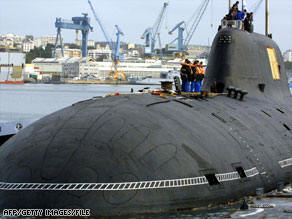
|
20 people died in
an incident involving the
failure of a fire
extinguishing system on a
Russian nuclear submarine,
local media report.
Russian Pacific Fleet
spokesman Igor Dygalo said
both sailors and shipyard
workers died in the
incident, which occurred
during sea trials. He said
the submarine itself had not
been damaged and there had
been no radiation leaks.
Military prosecutors are
investigating the incident.
The submarine, whose name
and class have not been
officially revealed, has
been ordered to suspend sea
trials and return to port in
the far eastern Primorskiy
territory, Capt Dygalo said.
"I declare with full
responsibility that the
reactor compartment on the
nuclear-powered submarine is
working normally and the
radiation background is
normal," he said, quoted by
Itar-Tass news agency.
|
|
|
CLOUDS OVER GULF |
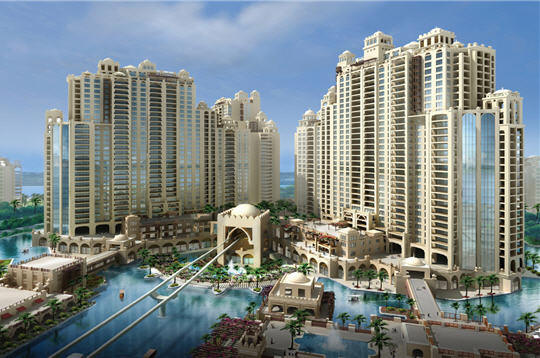
|
Is the fun over? Saudi Arabia
and Dubai are now down by around
50% this year, Kuwait down 20%
and the MSCI index tracking the
Gulf's key markets has lost 43%.
Last week, Kuwait became the
third Gulf state to prop up its
banking system, guaranteeing
deposits after bailing out the
country's fifth-biggest lender,
Gulf Bank, whose corporate
clients had defaulted on
currency bets. The United Arab
Emirates, of which Dubai is the
second-largest member, has
guaranteed local bank accounts
for three years and made $33bn
available to the banking system
amid a squeeze in local money
markets. Saudi Arabia has put
$5bn into commercial banks and
set aside $2.7bn for no-fee
loans to low-income citizens.
Central banks across the region
have also cut benchmark interest
rates. The main worry now is the
real-estate market, where credit
conditions are tightening – HSBC
will now only lend up to 70% of
the value of a property, down
from 85% – and the property boom
is rapidly cooling. Cairo-based
EFG-Hermes reckons property
values could slide by 20% in the
next three years. "I see the
risk of a real-estate bust
throughout the Gulf" amid
sliding oil prices and a
liquidity and credit crunch,
says Nouriel Roubini of New York
University. And "there's a huge
amount of excess capacity being
built": Dubai and Saudi
billionaire Prince Alwaleed are
currently racing to build the
world's first kilometre-tall
tower. Dubai can tap another
emirate, Abu Dhabi, for cash,
while the region as a whole
boasts a projected $150bn in
budget surpluses for 2008. The
IMF thinks most Gulf states
should be able to balance their
budgets unless oil slides below
$30 a barrel, says Andrew
Crichlow on WSJ.com. With large
current-account surpluses and
relatively low external
financing needs, the region
looks more resilient than other
emerging markets, says Merrill
Lynch, which has lowered its
regional 2009 GDP forecast to
4.5% from 6.2%. But while the
Gulf may not fall victim to an
emerging-market crisis, the
notion that it is a safe haven
from global turmoil has been
well and truly shattered. |
|
|
|
The
map shows hectares' worth consumed in goods and
services |
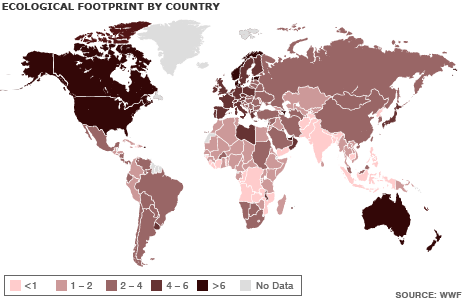 |
|
The planet is headed for an
ecological "credit crunch", according to
a report issued by conservation groups.
The document contends that our demands
on natural resources overreach what the
Earth can sustain by almost a third. The
Living Planet Report is the work of WWF,
the Zoological Society of London and the
Global Footprint Network. It says that
more than three quarters of the world's
population lives in countries where
consumption levels are outstripping
environmental renewal.
This makes them "ecological debtors", meaning that they are drawing
- and often overdrawing - on the
agricultural land, forests, seas and
resources of other countries to sustain
them. The report concludes that the
reckless consumption of "natural
capital" is endangering the world's
future prosperity, with clear economic
impacts including high costs for food,
water and energy. "If our demands on the
planet continue to increase at the same
rate, by the mid-2030s we would need the
equivalent of two planets to maintain
our lifestyles," said WWF International
director-general James Leape. Dr Dan
Barlow, head of policy at the
conservation group's Scotland arm,
added: "While the media headlines
continue to be dominated by the economic
turmoil, the world is hurtling further
into an ecological credit crunch." The
countries with the biggest impact on the
planet are the US and China, together
accounting for some 40% of the global
footprint. The report shows the US and
United Arab Emirates have the largest
ecological footprint per person, while
Malawi and Afghanistan have the
smallest. "The events in the last few
months have served to show us how it's
foolish in the extreme to live beyond
our means," said WWF's international
president, Chief Emeka Anyaoku.
"Devastating though the financial credit
crunch has been, it's nothing as
compared to the ecological recession
that we are facing." He said the more
than $2 trillion (£1.2 trillion) lost on
stocks and shares was dwarfed by the up
to $4.5 trillion worth of resources
destroyed forever each year. The
report's Living Planet Index, which is
an attempt to measure the health of
worldwide biodiversity, showed an
average decline of about 30% from 1970
to 2005 in 3,309 populations of 1,235
species. An index for the tropics shows
an average 51% decline over the same
period in 1,333 populations of 585
species. |
|
|
|
|
|
MICEX FALLS 75% SINCE
MAY |
 |
|
The
Russian President
Medvedev continues to
scold the world as the
MICEX, the
Moscow stock exchange,
collapses and Russian
oil changes hands for as
little as $10 a barrel
inside the country
suffering from a glut of
over production. This is
a demonstration of the
dangers of too much
government intervention.
The Russian MICEX market
has been the worst
performing in the second
half of this year so
far, reports The
Telegraph. Stocks have
fallen by 75% since May.
A key problem for Russia
is that it is massively
dependent on oil. Its
2009 budget only
balances if oil is
trading at an average
$95 a barrel. I can't
see that happening. So
its markets and the
rouble have come under
pressure with falling
oil prices. And of
course, as an emerging
market, it has taken a
hit as investors pull
their money out and
repatriate it to the
'safe haven' of the US.
But the state's attempts
to prevent the crisis
with brute force, have
only made things worse.
The central bank has
already had to spend
$120bn of its reserves
on defending the rouble,
which analysts reckon is
now 30% over-valued.
This is just a waste of
money. When a country,
particularly a
politically risky
country like Russia,
starts defending its
currency, it's a sure
sign to the market that
said currency is
over-valued. No central
bank in the world has
enough reserves to
defend against a forex
market set on helping a
currency to find its
"real" worth. |
 |
|
THE STATE OF
WORLD ECONOMY
RESEMBLES THIS
DRIED OUT MUMMY
BELIEVED TO BE
THE SON OF
RAMESES III |
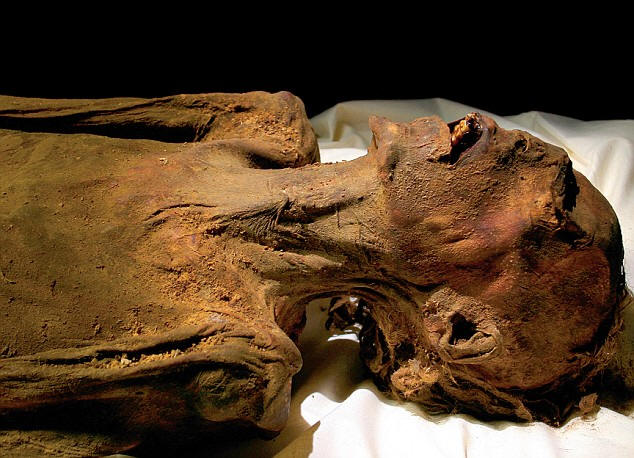 |
|
|
|
|
POUND STERLING
PLUNGES AS BANK OF
ENGLAND MAKES GRIME ECONOMIC FORECAST FOR UK |
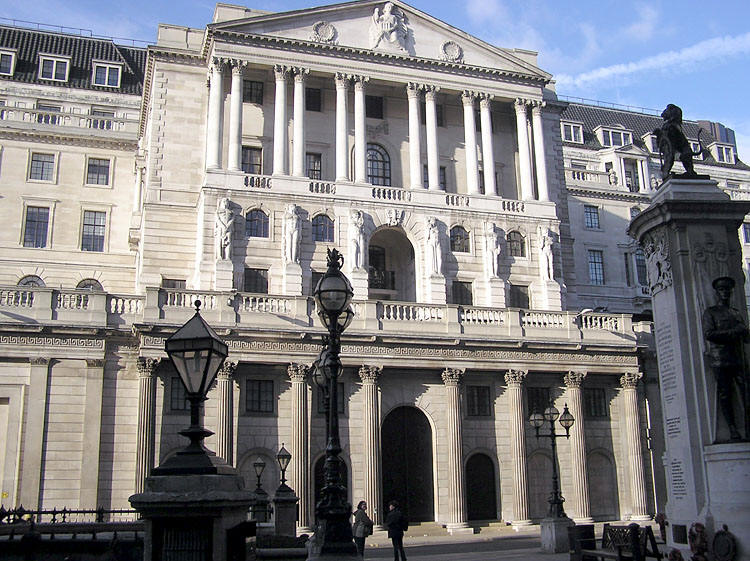 |
|
Whilst others
enjoyed yachts
Champagne and holidays at YOUR expense... |
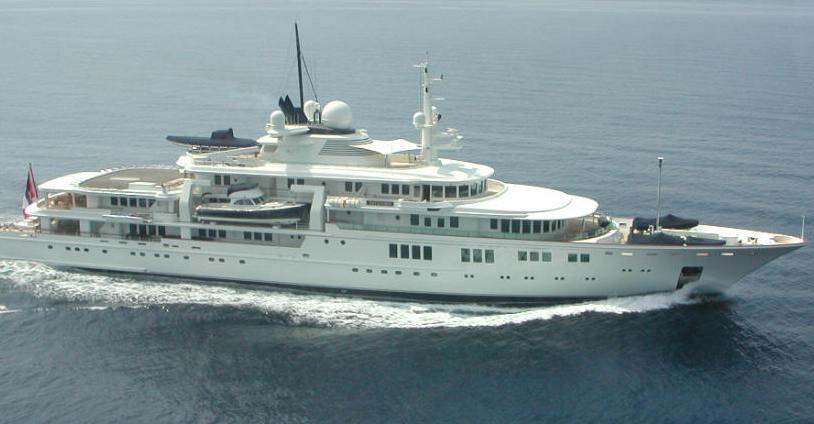
|
David Cameron was
labelled "Three Yachts" after it emerged
that he spent a second summer holiday
boat hopping in the lap of luxury. At
the same time John Prescott rejected
claims that he led a lavish lifestyle in
Government, insisting he did not enjoy
the wining and dining of high office.
The Conservatives slammed Mr Prescott
for living the “high life”, raking in
thousands on food, drink and travel
expenses heading the “non-job” Deputy
Prime Minister’s Office. Mr Prescott,
who has been fronting a BBC series on
class, denied he had benefited from the
cash and insisted he was only doing the
bidding of former Prime Minister Tony
Blair. |
|
|
|
|
|
Since food prices began to rise
100 million more people have been pushed into poverty,
according to the World Bank, with as many as two billion
on the verge of disaster. Almost half the world's
population, let's remember, live on less than $2.50 per
day. Millions die annually of hunger and starvation, and
more than a billion do not have access to fresh water. |
With the world financial crisis
these numbers are poised to rise dramatically with
population growth, dwindling natural resources and
higher consumer prices across all goods and services. So
as the stock market tumbles and the world economy
falters, it's important to remember that it's more than
financial losses we are talking about, it's the loss of
life. |
|
|